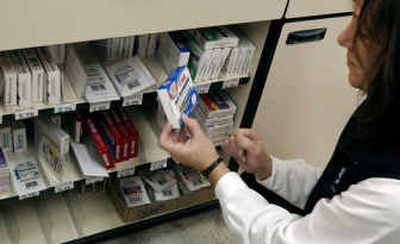Bill would put cold pills out of customers’ reach

BOISE – Several Idaho lawmakers say a simple step could be taken to help solve the state’s methamphetamine problem: Don’t let the drug’s makers buy cold medicine.
Four legislators have proposed a bill in the House that would ban the over-the-counter sale of pseudoephedrine, the generic form of Sudafed, a key ingredient in the making of meth.
The bill, spearheaded by Rep. Mike Mitchell, D-Lewiston, would make pseudoephedrine available only behind the counter at pharmacies. While a prescription wouldn’t be necessary, customers would have to show photo ID and sign for the medication. Records of those who buy the product would be available to law enforcement.
But the bill is being proposed at a time when law enforcement officials say the number of meth labs has decreased by as much as 60 percent in the state since 2003. And retailers say the proposed law would hinder consumers and store owners, who would have to reshuffle their stores.
“It’s a shame that we’re going to this far of an extent for something that’s not a big problem in Idaho anymore,” said Pam Eaton, president of the Idaho Retailers Association.
Many stores, like Ron McIntire’s four Super 1 grocery stores in Kootenai County, keep cold medicines behind the counter already. In fact, McIntire said, his stores, which also have pharmacies, keep Sudafed and other similar medication behind a glass window – but not in the pharmacy. Customers who want the products take a card from the aisle and scan it with a clerk at the front of the store. The clerk then gets the medicine for the customer.
The switch to behind-the-counter sales of medication and cigarettes at Super 1 was made about three years ago. Since then, McIntire said, sales of the two products have decreased roughly 40 percent, but profits have stayed the same.
The incongruity comes from the huge amount of cold medicines and cigarettes that were shoplifted in the past.
Still, McIntire is opposed to the pseudoephedrine bill because of the extra costs the pharmacies in his stores would incur. Besides remodeling to create space to put the medicine behind pharmacy counters, McIntire said he would have to staff $45-per-hour pharmacists more frequently instead of $15-per-hour clerks.
“It’s overkill,” said McIntire of the bill.
Not all store owners agree. Bill Peterson, owner of Sherman IGA in Coeur d’Alene, thinks the bill is a good idea. His store stopped carrying medication like Sudafed two or three years ago because of concerns related to meth.
If the bill were to become law, meth makers “could only buy Draino and matches from stores like ours,” Peterson said.
Eaton and other critics say the legislation also would hinder consumers in small communities – most of which don’t have all-night pharmacies – who would only be able to get the decongestant during standard business hours.
When asked if small-town consumers should worry about the bill, Rep. Bob Ring, R-Caldwell, one of the sponsors, said liquid and gel cap forms of pseudoephedrine would be exempt from the law.
Currently, law enforcement officials say, meth producers are only able to break down the pill form of pseudoephedrine to turn into the drug.
Ring and one of the other sponsors, Rep. John Rusche, D-Lewiston, both are physicians.
Ring noted some medication manufacturers are coming out with cold medicine that doesn’t contain pseudoephedrine.
Pfizer, for example, is currently shipping Sudafed PE to stores around the country, according to company spokesman Tom Sanford. It has the same effect as regular Sudafed but uses phenylepherine instead of pseudoephedrine.
If the bill passes, it would take effect 30 days after the governor signed it into law.
Though various states have passed similar legislation, the group’s proposal is almost identical to a law Oklahoma passed last year, Ring said. Meth lab seizures there are down 80 percent since the law was enacted, he said.
Mitchell and the other sponsors say something has to be done to curtail the meth problem, if only to protect children and others who come in direct, or indirect, contact with the cooking process. The inconvenience to consumers and retailers is worth it, they said.
“This is a very dangerous and expensive problem – worse than cocaine,” Mitchell said. “If we don’t get rid of it, then so many will continue to be adversely affected.”
Idaho State Police Col. Dan Charboneau, said that in 2003, 80 meth labs were discovered in Idaho, and as of last October, only 33 had been found in 2004.
However, he added, “We don’t find every one out there.”
Of the labs that were found, most were small user labs rather than manufacturing labs, he said, but they still pose safety concerns. The major production of meth now comes from outside the state, largely from Mexico.
“It’s the No. 1 drug law enforcement deals with across the state,” Charboneau said. “It pulls officers off cases when a lab is found. It disrupts our ability to do other things.”